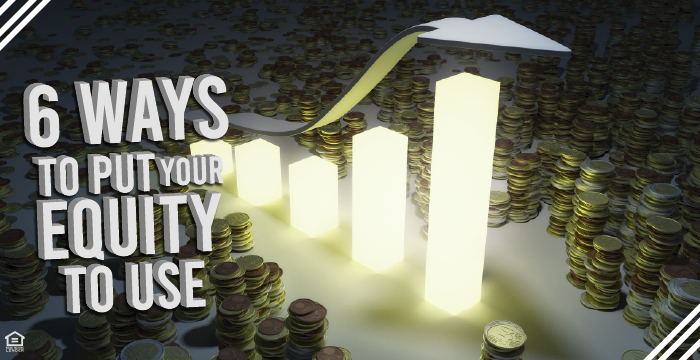
Home Equity Reaches Record Highs- 6 Ways to Put Your Equity to Use

Homes with a mortgage gained an average of $26,300 in equity during the last three months of 2020 versus a year earlier. The average gain is the highest since 2013, and the surge in homeowner’s equity creates a buffer against financial hardship for many borrowers. As a result, many homeowners have opted to put some of the gains to use, giving a boost to the economy.
What is Home Equity?
Home equity is the portion of your home that you’ve paid off. It’s the difference between what your home is worth and the amount that’s still owed on your mortgage. Equity amounts fluctuate over time as mortgage payments are made and the market impacts the value of your property.
For many borrowers, equity from homeownership is an important way to build personal wealth over time. As you pay down the principal mortgage and your home’s value increases over the long-term, your equity grows.
Listed below are six popular ways to tap into your home equity:
1. Consolidate Debt
A very popular use of home equity is to consolidate debt at a much lower rate, and over a longer term. Borrowers can reduce their monthly expenses significantly by using the money from a cash-out refinance to pay off high-interest credit cards.
If you have a solid debt payoff plan, using your home equity can help you get out of debt faster at a substantially lower interest rate.
2. Home Improvements and Renovations
Home improvements are one of the most common reasons homeowners take out home equity loans. Upgrades could raise your home’s value and draw more interest from prospective buyers when you’re ready to sell later on. Home equity is a great way to finance larger projects like a kitchen renovation, new deck, or a garage. In many cases, these investments can pay for themselves by increasing the home’s value.
3. Down Payment for a Second Home or Investment Property
Some homeowners opt to put their gains towards buying more real estate. As an asset, real estate can build wealth quickly. For example, you could add $500,000 of real estate with a down payment of 10 percent ($50,000) to your portfolio. A 5 percent gain on a $500,000 home creates $25,000 in new wealth, which is a 50 percent return on the original investment.
If you’re not looking to rent out an investment property, you can still cash-out your primary residence to buy a second home. A vacation home for your family offers relief from booking hassles and hotel prices- and you always have the option to rent out the new home for income when it’s not in use.
4. College Expenses
While student loans are still the most common way to pay for an education, home equity can be advantageous while mortgage rates are considerably lower than student loan interest rates. Home equity can also extend the term of the debt, reducing the payment.
If you’re considering funding your child’s education with a home equity loan product, be sure to calculate monthly payments during the amortization period and determine if you can repay the debt before retirement. If this doesn’t seem feasible, you may want your child to take out a student loan, as they will have many more income-making years to repay the debt.
5. Wedding Expenses
According to The Knot, the average cost of a wedding in 2020 was $19,000, down from the pre-pandemic figure of $28,000 in 2019. Keep in mind that these figures do not include the average cost of a honeymoon.
To pay for this special life event, some couples turn to wedding loans, or personal loans. The interest rates on those loans, however, are typically higher than interest rates on home equity loans because they are not tied to an asset.
6. Refinance to Remove Your Mortgage Insurance
If you took out a Federal Housing Administration (FHA) loan for your mortgage, using your equity to refinance could save you money in the long-run. All FHA loans come with mortgage insurance, regardless of the down payment amount. FHA mortgage insurance can never be removed if you made a down payment of less than 10%; but you can get rid of FHA mortgage insurance payments by using your equity to refinance the mortgage into a non-FHA loan.
While it is possible to refinance to get rid of Private Mortgage Insurance (PMI) on a non-FHA conventional loan, keep in mind that your PMI is automatically canceled when the loan amortizes to 78 percent of the original value of the home.
Closing Thoughts
If you use your home equity to add value to your home or better your financial position, keep in mind that if you fail to repay a home equity loan, you could lose your home to foreclosure. It’s always a good idea to run the numbers to ensure that you can continue paying your regular mortgage on top of a new home equity loan.